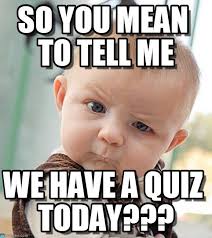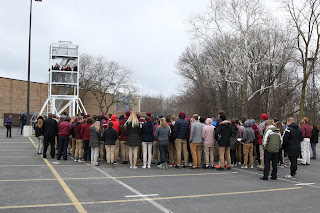In ten minutes, or, privacy on the internet...
We spend a lot of time in AP English talking about our actions
online: Facebook comments, our personal blogs, and what comes up when we
google ourselves. After all these years of student talks, I am
hyper-vigilant about how I act online as well as how I see others act
online. It's hard to separate my teacher self from the out-of-school
self and NOT try to school someone on the internet for bad grammar and
rude tone!
Earlier this week, I commented on an article an old friend posted on Facebook that was of a political nature. Later that day, another of their friends replied to my comment -- with profanity, hyperbolic assertions about my intelligence, and uncalled-for insults.
This person has literally no connection to me, but because I was curious, and not a little offended, I clicked on their profile. In the space of ten minutes on the profile which had privacy settings on I could glean the following information:
However, the smattering of randomly selected posts that popped up on the timeline shows this person in uniform with the "check-in" at their workplace, memes and articles that suggested religious and political views, as well as GPS tags of other locations, such as a golf course, bars, and vacation places. It would be extremely easy for me to locate this person in real life.
Many people don't realize, but it is quite simple to access location data from an image. If you have the location turned on for your camera, the metadata of a photo might store the exact latitude and longitude where a photo was taken, and it can be plugged into Google maps. This means that a high schooler who takes a prom photo in her front yard tells the entire world where her house is. On vacation? I know which beach.
I tell my students that there are several reasons to be aware of your online presence, both proactive and reactive. Proactively, many more employers (up to 70%!) and college admissions counselors are looking at applicants' online activities these days as they decide who to invite on board. It is a good idea to make your online self look as desirable a candidate as your real-life self. Reactively, people with dangerous goals also scour the internet for information. Last year, WANE-TV, a local news station, did a series on sex trafficking in our county. Traffickers often use information gleaned easily on social media to target and groom children. As cool as my juniors' blogs are, many of them are still over-sharing information, including emails, last names, and cell phone numbers. It's in kids' natures to share, so the digital citizenship and safety lessons are ongoing.
It is difficult, nearly impossible, to keep all personal information off the internet, especially if you decide to use social media at all. However, I urge my students (and all adults!) to be wary of what you post, and who can access it. Make your profiles as private as possible, do not allow followers you don't know, and look closely at privacy settings and app permissions.
Few of my students are aware of the permissions they give apps like Snapchat, not realized the app could basically wiretap them legally AND own all the data they gathered (Here are 10 tips to make Snapchat more private)! Obviously don't post when you're on vacation. Blur out details on photos, like license plates or your driver's license number (16-year-olds tend to take pictures of their new licenses a lot!).
Takeaway: if you don't want what you post to show up during one of my AP English lectures, don't post it!
----
UPDATE 3/24/18: The Wall Street Journal's Katherine Bindley did a nice piece this week with tips on how to distance yourself from Facebook if you're interested! Also, Facebook has a "View as" feature underneath the extra settings on the homepage so you can see what on your page is available to the public. I found out all my profile and cover photos were public - including lots of my children, so I fixed that!
Earlier this week, I commented on an article an old friend posted on Facebook that was of a political nature. Later that day, another of their friends replied to my comment -- with profanity, hyperbolic assertions about my intelligence, and uncalled-for insults.
This person has literally no connection to me, but because I was curious, and not a little offended, I clicked on their profile. In the space of ten minutes on the profile which had privacy settings on I could glean the following information:
- high school alma mater
- workplace
- NFL affiliation
- dog's name
- hobbies
- religious views
- political views
- approximately six months of travel history
However, the smattering of randomly selected posts that popped up on the timeline shows this person in uniform with the "check-in" at their workplace, memes and articles that suggested religious and political views, as well as GPS tags of other locations, such as a golf course, bars, and vacation places. It would be extremely easy for me to locate this person in real life.
Many people don't realize, but it is quite simple to access location data from an image. If you have the location turned on for your camera, the metadata of a photo might store the exact latitude and longitude where a photo was taken, and it can be plugged into Google maps. This means that a high schooler who takes a prom photo in her front yard tells the entire world where her house is. On vacation? I know which beach.
I tell my students that there are several reasons to be aware of your online presence, both proactive and reactive. Proactively, many more employers (up to 70%!) and college admissions counselors are looking at applicants' online activities these days as they decide who to invite on board. It is a good idea to make your online self look as desirable a candidate as your real-life self. Reactively, people with dangerous goals also scour the internet for information. Last year, WANE-TV, a local news station, did a series on sex trafficking in our county. Traffickers often use information gleaned easily on social media to target and groom children. As cool as my juniors' blogs are, many of them are still over-sharing information, including emails, last names, and cell phone numbers. It's in kids' natures to share, so the digital citizenship and safety lessons are ongoing.
It is difficult, nearly impossible, to keep all personal information off the internet, especially if you decide to use social media at all. However, I urge my students (and all adults!) to be wary of what you post, and who can access it. Make your profiles as private as possible, do not allow followers you don't know, and look closely at privacy settings and app permissions.
Few of my students are aware of the permissions they give apps like Snapchat, not realized the app could basically wiretap them legally AND own all the data they gathered (Here are 10 tips to make Snapchat more private)! Obviously don't post when you're on vacation. Blur out details on photos, like license plates or your driver's license number (16-year-olds tend to take pictures of their new licenses a lot!).
Takeaway: if you don't want what you post to show up during one of my AP English lectures, don't post it!
----
UPDATE 3/24/18: The Wall Street Journal's Katherine Bindley did a nice piece this week with tips on how to distance yourself from Facebook if you're interested! Also, Facebook has a "View as" feature underneath the extra settings on the homepage so you can see what on your page is available to the public. I found out all my profile and cover photos were public - including lots of my children, so I fixed that!







Comments
Post a Comment